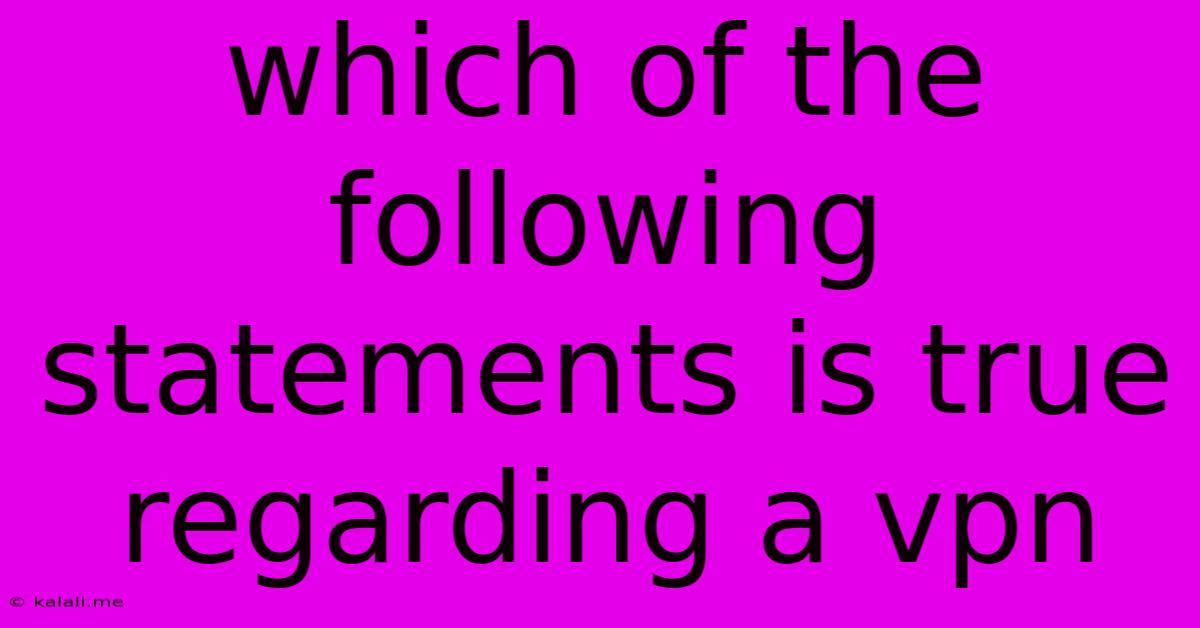Which Of The Following Statements Is True Regarding A Vpn
Kalali
Jun 16, 2025 · 3 min read

Table of Contents
Which of the Following Statements is True Regarding a VPN? Demystifying Virtual Private Networks
A VPN, or Virtual Private Network, has become a household name, but understanding its true capabilities and limitations can be tricky. Many misconceptions surround VPNs, leading to confusion about their actual function. This article will clarify some common statements about VPNs, helping you determine which are true and which are myths. We'll explore VPN functionalities, security benefits, and limitations to provide a comprehensive understanding.
What is a VPN and Why Use One? A VPN creates a secure, encrypted connection between your device and the internet. This encrypted tunnel protects your online activity from prying eyes, including your internet service provider (ISP), hackers, and government surveillance. VPNs are often used to mask your IP address, providing anonymity and enabling access to geo-restricted content. This is crucial for privacy and security in today's digital world. Choosing the right VPN for your needs involves considering factors like security protocols, server locations, and logging policies.
Now, let's address some common statements about VPNs and determine their validity:
Statement 1: VPNs make you completely anonymous online.
FALSE. While VPNs significantly enhance your online privacy by encrypting your data and masking your IP address, they don't guarantee complete anonymity. Sophisticated tracking techniques can still potentially identify you, especially if you're engaging in activities that leave digital fingerprints. Moreover, your online activities within the VPN connection might still be traceable to you depending on the website or service you are using. Think of a VPN as a powerful tool for enhancing your privacy, not achieving absolute anonymity.
Statement 2: VPNs protect you from all malware and viruses.
FALSE. VPNs primarily focus on protecting your data in transit, encrypting the communication between your device and the VPN server. They don't inherently protect against malware or viruses that might already be on your device or downloaded from malicious websites. Think of a VPN as a shield for your internet connection; it's a crucial security measure, but it's not a replacement for a robust antivirus program and safe browsing habits. A comprehensive security strategy includes both.
Statement 3: VPNs always improve internet speed.
FALSE. While a VPN can sometimes improve internet speed by bypassing network throttling, it often introduces latency due to the added encryption and routing through a remote server. The distance between your device and the VPN server significantly affects speed. Choosing a VPN server geographically closer to you can mitigate this, but it's important to understand that a VPN can sometimes slow down your internet connection.
Statement 4: VPNs can bypass all geo-restrictions.
FALSE. Many streaming services and websites actively work to block VPNs. While some VPNs are more effective at bypassing these restrictions than others, no VPN guarantees access to all geo-restricted content. The effectiveness of a VPN in this regard depends on the sophistication of the VPN provider and the anti-VPN measures employed by the website or service in question.
Statement 5: Using a free VPN is a safe and reliable option.
FALSE. Free VPNs often come with trade-offs, including slower speeds, limited server locations, and potential privacy concerns. Some free VPNs are known to log user data or even inject malware into their clients. While a free option might seem tempting, the risks to your privacy and security often outweigh the benefits. It's generally recommended to opt for a reputable paid VPN provider for enhanced security and privacy features.
In conclusion, VPNs are valuable tools for enhancing online privacy and security, but understanding their capabilities and limitations is crucial. While they offer significant benefits, they are not a panacea for all online threats. Choosing a reliable VPN provider and understanding its functionality are essential for maximizing the benefits and minimizing the risks.
Latest Posts
Latest Posts
-
Select The Term With The Correct Spelling
Jun 16, 2025
-
If Qt Is Perpendicular To Pr
Jun 16, 2025
-
History Multiple Choice Questions And Answers Pdf
Jun 16, 2025
-
American University Of Paris Acceptance Rate For International Students
Jun 16, 2025
-
Which Of The Following Statements Is True Of Lake Victoria
Jun 16, 2025
Related Post
Thank you for visiting our website which covers about Which Of The Following Statements Is True Regarding A Vpn . We hope the information provided has been useful to you. Feel free to contact us if you have any questions or need further assistance. See you next time and don't miss to bookmark.